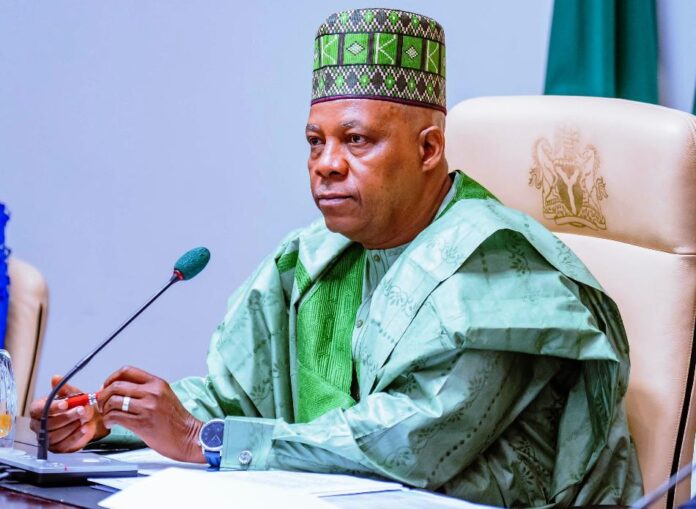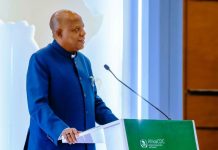The Vice President, Senator Kashim Shettima, has assured that Nigeria will soon phase out diesel dependency and cut carbon emissions through the nation’s integrated hybrid energy system.
He said that while the truth about the nation’s climate question is that Nigeria can no longer build yesterday’s infrastructure for tomorrow, climate action has now become an economic necessity and not a luxury.
The Vice President, who stated this on Wednesday when he declared open the Decarbonising Infrastructure in Nigeria Summit (DIN SUMMIT) in Abuja, warned that Nigeria would struggle to compete or catch up with the world if the nation’s climate dreams do not align with its development realities.
“Onne Port, for instance, is already emerging as the template for our quest to breathe life into a robust green economy. Discussions are currently underway with private investors to commit nearly $60 million to electrify the port and transform it into Nigeria’s first green port.
“This is a strategic leap. Through an integrated hybrid energy system, we will phase out diesel dependency, slash carbon emissions, and provide 24/7 sustainable and affordable power to terminal operators and port users,” he said.
This summit is inspired by the awareness that we can no longer afford to treat sustainability and profitability as two separate pursuits. This is a product of months of consultations, regional dialogues, and technical deep dives. That is why it reflects our belief that the path to net-zero by 2060 must be paved with concrete action, not convenient rhetoric. Our Energy Transition Plan and Climate Change Act have together created a roadmap that is both visionary and pragmatic.
VP Shettima explained that 75% of Nigeria’s greenhouse gas emissions come from the infrastructure sector, including energy, transport, urban development, and agriculture.
These sectors, according to him, are not just carbon-heavy but also form the nation’s economic arteries, especially agriculture, which supports 70% of rural livelihoods.
Senator Shettima observed that while the staggering figures are a wake-up call for a nation that figures them out, the only way of the “predicted doom is to decarbonise these systems,” adding that the target is to build a Nigeria with infrastructure that heals, and not one that harms.
He stated, “This is how we can alter our trajectory. If we do this right, we stand to generate over 1.5 million green jobs by 2035. We can also cultivate new export markets in clean energy and climate-smart agriculture, which would transform Nigeria into a regional leader in low-carbon enterprise.
“Distinguished ladies and gentlemen, we are not here to fantasise. We are here to finance. To mobilise. To de-risk. To build. The Nigeria we want cannot be realised on diesel generators and fragile grids. It will not emerge from a model that chokes our lungs while draining our treasury. We must build a Nigeria whose infrastructure heals rather than harms.”
The Vice President described the theme of the summit, “Unlocking Climate Finance for Sustainable Development,” as very apt, as the nation faces an urgent and immense task of decoupling its development from the carbon-intensive models of the past and to do so without leaving any Nigerian behind.
“This is why we must strengthen our regulatory frameworks. This is why we must harmonise policy across sectors and tiers. This is why we must launch tools like the Green Investment Portal to connect capital to climate-smart opportunities.
“This is why we must have our states at the forefront of this march to the future to show that decarbonisation must not stop at Abuja’s gates. It must reach every local government, every community, every home,” he maintained.
Earlier, the Director General and CEO of the National Council on Climate Change (NCCC), Dr. Nkiruka Maduekwe, said Nigeria must urgently transition to a low-carbon economy despite contributing minimally to global emissions because of its vulnerability to climate change impacts.
“Although Nigeria’s contribution to the global carbon emission is very minimal, Nigeria is highly vulnerable to the impacts of climate change because of its location in the African continent and because of our low adaptive capacity,” Dr Maduekwe said.
She outlined key areas requiring transformation, including smart agriculture practices to reduce emissions and enhance sustainability through optimised resource use, renewable energy adoption, and carbon sequestration through improved land management.
She also called for substantial private sector investment in sustainable infrastructure development, particularly in energy systems and transportation transformation.
Also, Personal Assistant to the President on Subnational Infrastructure (Office of the Vice President), Musaddiq Mustapha Adamu, emphasised the administration’s commitment to subnational leadership in driving climate innovation.
“Today’s summit is not just about emissions but about equity, economic survival and building a future where infrastructure does not bury the planet but restores hope and empowers society, especially the young, the poor and the marginalised,” Adamu said.
Signed
Stanley Nkwocha
Senior Special Assistant to The President on Media & Communications
(Office of The Vice President)
2nd July, 2025






